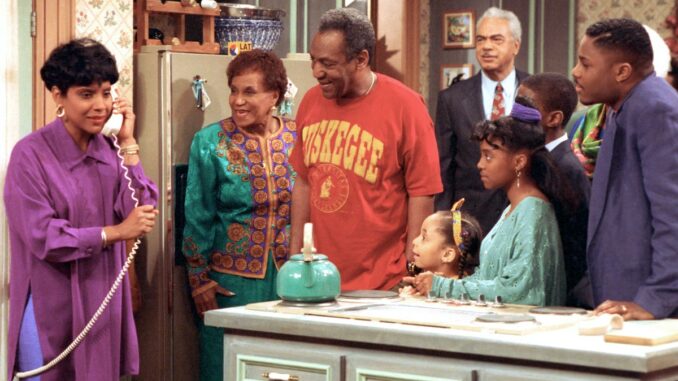
When The Cosby Show became a cultural phenomenon in the 1980s, it was more than just a family sitcom. It redefined how African-American families were portrayed on television, offering a portrayal of success, love, and intellectualism that had been largely absent from mainstream TV. The Huxtables quickly became a beloved part of American TV history. So why, in today’s TV landscape, is a new generation of viewers not seeing a Cosby Show reboot or revival?
The answer is complex, rooted in changing media dynamics, evolving cultural values, and the undeniable shadow cast by its creator, Bill Cosby. Let’s explore the factors at play:
1. The Shadow of Bill Cosby’s Legacy
The most immediate and obvious barrier to a Cosby Show reboot is the scandal that has clouded Bill Cosby’s legacy. His conviction for sexual assault and the broader allegations against him have complicated how we view the show today. While the show itself was groundbreaking and beloved for its portrayal of an upper-middle-class African-American family, the association with Cosby—who was also the show’s creator and star—has made any attempt to revisit The Cosby Show feel uncomfortable. In an era where Hollywood is increasingly focused on accountability, reviving a show so closely tied to a controversial figure is a non-starter for many networks and audiences alike.
2. The Changing Landscape of TV and Representation
In 1984, The Cosby Show was revolutionary. It presented an African-American family living the “American dream,” defying the prevailing stereotypes of Black families in media. But in today’s TV landscape, the definition of African-American family stories has evolved. Shows like Black-ish, Atlanta, and Insecure have taken storytelling to new, more nuanced levels, exploring a broader spectrum of Black experiences—without relying on idealized, picture-perfect portrayals.
While The Cosby Show was incredibly important in its time, the way Black families and individuals are represented in media today is far more diverse. There’s less of an emphasis on showing “perfect” families and more focus on depicting authentic struggles, complex characters, and real-life issues. Networks and audiences are craving diversity in the stories told about Black families—showcasing both their triumphs and challenges.
3. The Shift to Streaming and Changing Viewer Habits
The way we consume television has undergone a massive transformation. When The Cosby Show first aired, it was a staple of family viewing, a program that families gathered around to watch together on network TV. But in today’s era of streaming platforms, on-demand content, and binge-watching, network television isn’t as dominant as it once was. New generations of viewers are more likely to watch shows on Netflix, Hulu, or Amazon Prime, where they have access to a much wider variety of content.
Furthermore, traditional sitcom formats like The Cosby Show are no longer the driving force in prime-time TV. Audiences today are more drawn to serialized storytelling or genre-bending shows, where sitcoms may not hold the same appeal as they once did. The family sitcom, especially one built around the formula of a “perfect” nuclear family, has become less relatable to today’s younger, more diverse viewers who expect their media to reflect a broader range of identities, cultures, and experiences.
4. Cultural Shifts in Comedy and Family Dynamics
The humor of The Cosby Show was largely based on the relatable ups and downs of family life, but the show’s comedic style, rooted in a more wholesome, family-friendly approach, might feel outdated in today’s more edgy TV environment. Modern family sitcoms tend to be more self-aware, irreverent, and willing to dive into deeper, often darker, social commentary. Shows like The Middle or The Good Place offer lighter takes on family dynamics, while Black-ish is more daring in addressing issues of race, identity, and privilege with humor that resonates with a modern audience.
Younger generations have grown up with a different set of comedic influences—whether it’s the sharp wit of Parks and Recreation, the dark humor of BoJack Horseman, or the cultural commentary of South Park. The tone and pacing of a show like The Cosby Show may not align with today’s comedic sensibilities, making it harder for a reboot to appeal to the current audience.
5. A Legacy That’s Better Left Untouched?
Even beyond the issues of Cosby’s personal scandal and the changing media landscape, there’s an argument to be made that The Cosby Show’s legacy is too important to be “rebooted.” Sometimes, it’s best to leave iconic shows in the past, allowing them to remain as cultural landmarks that defined a moment in television history. Any attempt to remake or reboot the show could risk diluting its impact or failing to live up to the original, something many fans of the original may find difficult to accept.
Instead of trying to recapture the magic of the Huxtables, creators and networks are channeling the spirit of the show into new narratives that reflect the diversity and complexities of modern family life. This is where shows like Black-ish and The Upshaws come in—offering contemporary takes on Black family life, but with a new approach, new characters, and new challenges.
Conclusion: The Huxtables Live On—But in New Ways
While we might never see a Cosby Show reboot on network TV, its cultural legacy endures in more subtle ways. The portrayal of strong, Black families with nuanced stories continues to thrive, just in different forms. Whether through newer sitcoms or more dramatic family shows, The Cosby Show’s impact on how we view African-American families on television cannot be overstated.
As we move into an era of more complex, diverse, and sometimes raw storytelling, we’re seeing that the Cosby Show is not a relic to be resurrected, but a foundation upon which modern TV is being built. So while a new generation may not get to experience the Huxtables on their screens again, they are certainly benefiting from the doors The Cosby Show opened. And perhaps that’s the best way to honor its legacy—by letting it inspire new stories, for a new generation.